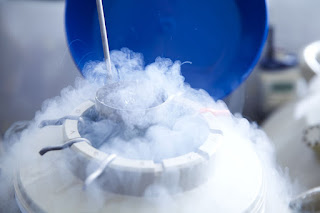When are women most fertile during their life?
The best time for a woman to have children is between her late
teens and late 20s. Fertility, or the ability to have children, starts to go
down after age 30. When you reach the middle of your 30s, this decline speeds
up. By the time a woman is 45, her fertility has dropped so much that it is
unlikely that she will get pregnant on her own.
Why does fertility decline as you get older ? This is
because a woman has a set number of eggs
in her ovaries at birth, and she does not produce any new eggs in her lifetime.
As a woman gets older, she has less eggs because her eggs start running out
with each menstrual cycle. Also, older women are more likely to have eggs that
have chromosomes that aren't right because they have aged. Also, as women get older, they are more likely
to get diseases like fibroids and endometriosis that can make it hard for them
to get pregnant. Incidentally , a man’s fertility is not affected by his age
because his testes constantly produce fresh young new sperm throughout his
lifetime.
How are the odds of getting pregnant in your bedroom affected
by your age ?
For healthy couples in their 20s and early 30s, about 1 in 4
women will get pregnant during a single menstrual cycle. This is called
fecundity. By age 40, about one in ten
women will get pregnant each time they have their period.
Women who have babies later in life are more likely to have
problems during their pregnancy .
For example, people over 40 are more likely to have high
blood pressure. Preeclampsia is more likely to happen if a woman has high blood
pressure before she gets pregnant. But studies also show that even if an older
woman is in good health, she still has a higher risk of having complications
during her pregnancy, which is considered to be high-risk because of her
advanced age.
The risk of birth defects increases as a woman gets older.
In general, the
chance of having a baby with an abnormal number of chromosomes is low. But as a
woman gets older, she is more likely to have a child with missing, broken, or
extra chromosomes. Down syndrome (also called trisomy 21) is the most common
problem with chromosomes that happens when women have babies later in life. The
chances of having a child with Down syndrome is 1 in 1,480 at age 20, 1 in 940
at age 30, 1 in 353, at age 35, 1 in 85 at age 40, and 1 in 35 at age 45.
What can you do if you are worried about babies being born
with problems?
Prenatal screening tests are done after you get pregnant and can figure out how
likely it is that your baby will have a certain birth defect or genetic
disorder. Screening tests can also be done
before you get pregnant, to check if you are a carrier of genetic diseases
Creating a reproductive life pan
All women should think about whether or not they want
children and, if so, when they would like to have them. If you want to have
kids someday, your plan can be as simple as saying, "I want to finish
school and save more money before having kids," or "I want to have
kids when I'm in my 20s, when my chances of having a healthy pregnancy are
best." If you want to get pregnant soon, you should try to be as healthy
as possible before you get pregnant. Take steps to stop drinking, smoking, and
using drugs. You should also start taking folic acid, which is found in
prenatal vitamins, to help prevent neural tube defects (NTDs).
What is prepregnancy planning ?
This is a visit to your ob-gyn that helps you plan for a
pregnancy. During this appointment, your gynaecologist should review your
medical history, the medical history of your family, any previous pregnancies,
and any medicines you take. You should also check your immunizations to make
sure you have all of the recommended shots, such as rubella.
How can you protect your fertility ?
At the moment, there is no medical method that can guarantee
that a person will stay fertile. If you are married and know you want to have
kids later in life, but don’t want to have a baby right now, you can do IVF and
freeze your embryos when you are young.
This allows you to have your cake and eat it too, because you can transfer
these healthy embryos into your uterus when you are ready to become a mom.
Another option is to freeze your eggs if you aren’t married.
Social egg freezing has become very popular, and you should think of it as
being an insurance policy if you want to postpone child-bearing for a few
years.









.jpg)







.jpg)